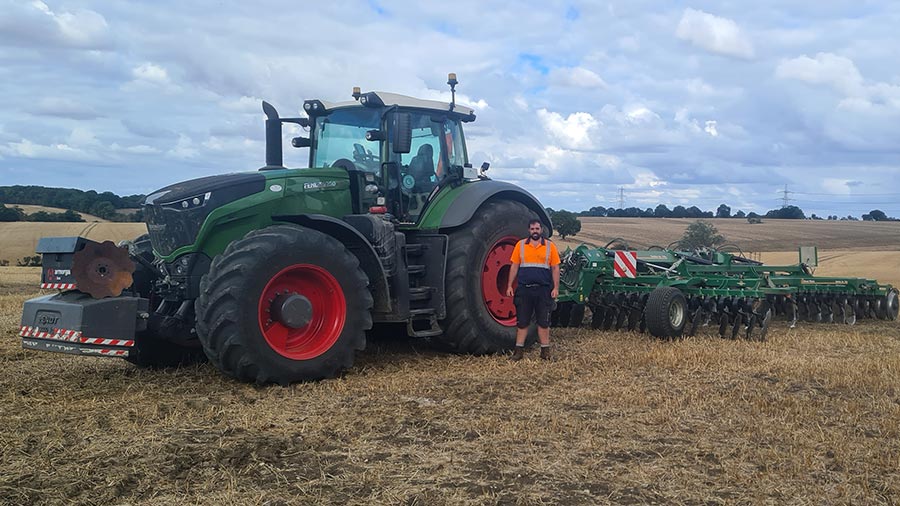Farming careers: Working as a sprayer operator
 © Stuart Goddard
© Stuart Goddard Stuart Goddard, 33, is the sprayer and combine operator and assistant manager at a 1,821ha joint venture business called Gilston Crop Management in Hertfordshire.
The business grows wheat, barley, oilseed rape, beans, sugar beet and oats, and is in a Countryside Stewardship agreement.
Stuart’s parents and grandparents were farmers when he was growing up, and he started working on the farm during summer holidays, weeding fields and planting potatoes, and gradually moving onto bigger jobs.
See also: Farming careers: Working as a pig unit manager
After school, he went straight into farming, working on different units to build up his experience and knowledge, as well as passing courses for all the qualifications he needed, such as spray tickets and forklift training.
Stuart spotted a job advert for his current role a few years ago and had an interview with the company directors before being appointed.
This year he completed his fifth harvest at the farm, alongside his manager (the other full-time member of staff) and several harvest students.
When spraying, Stuart works six days a week for 12 hours a day. Harvest work starts at about 6.45am and will continue late into the night.
He spends the quieter winter months servicing the machines, loading lorries, tidying the holding and collecting NRoSO points.
“Spraying is my favourite job because I get to see the crops from the first spray to the last and see how they’re doing, and seeing the crops grow and improve is a big enjoyment for me and very satisfying,” said Stuart.
“I never went to college or university but I wouldn’t change it because I’ve got lots of qualifications, I’m working on a big farm and I’m pleased with how it has worked out.”
Job profile
What does the job involve?
Spraying pesticides on fields, usually with either self-propelled, trailed or mounted sprayer.
It requires good attention to detail, making sure that the right type and quantity of pesticide are added to the sprayer in the correct order, properly mixed with the water and sprayed out onto the crop at the correct water volume, with the correct nozzle selection and at the optimum speed to reduce drift of the spray, in the right weather conditions.
What qualifications/experience are needed?
You need sprayer operating experience and specific pesticide safety qualifications such as the PA1 Handling & Application of Pesticides Foundation module and the PA2 Mounted and Trailed (hydraulic nozzle) Boom Sprayer module (the legal minimum for operating a sprayer).
After this, it is vital operators attain 30 National Register of Sprayer Operators (NRoSO) CPS points over a three-year period.
These can be collected by attending registered courses and events or liaising with the farm’s agronomist on a regular basis.
There are also separate specialist qualifications: PA3, PA4 and PA6, which cover orchard sprayers, slug pellet applicators and hand-held lances/knapsacks.
As the sprayer operator is also the person most likely to see all the areas of crops, having a Foundation or full Basis qualification will also be extremely useful for any operator to maximise their skills and value to the business.
What are the benefits of this job?
The role allows you to be outside and see large parts of the farm in any one day.
It requires a good amount of diligence, not only dealing with the pesticides but also while driving through the crops, reporting back what’s seen, recording what has been sprayed and in what weather conditions.
As such, it is seen as one of the most important roles on an arable farm, seeing the crops through the whole of the growing cycle.
What would a typical salary be?
For a lot of sprayer operators there’s a basic salary, plus overtime, but this can range anywhere from £20,000 to £50,000 plus accommodation.
How can you progress from this role?
The best sprayer operators have a high level of attention to detail, understand the importance of safety of the operator and wildlife, have good record keeping and understand the tasks at hand when spraying.
I expect progression can be seen through the size of sprayer, perhaps going from a mounted sprayer to a trailed sprayer to, ultimately, a self-propelled sprayer, which also has a bigger boom width and tank capacity, as well as the latest technology regarding GPS and nozzle cut-off.
How can employers best manage and maintain staff for this role?
This is about giving good working conditions, keeping employees fully trained and in a safe and modern working environment.
It may be that the employer can give some sort of bonus relating to how the operator performs, including the accuracy of spraying and the ultimate crop yields.
Source: Will Gemmill, partner, Ceres Rural
